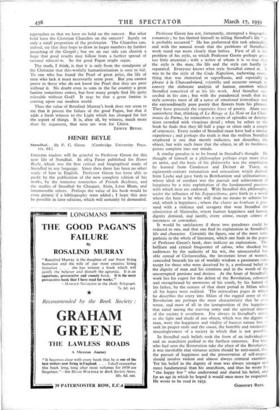HENRI BEYLE
ENGLISH readers will be grateful to Professor Green for this new life of Stendhal. In 1874 Paton published his Henri Beyle, which was the first critical and biographical study of Stendhal in any language. Since then there has been no other study of him in English. Professor Green has been able to profit by the publication of the now complete edition of his works, by the immense researches of French Beylistes, and the studies of Stendhal by Chuquet, Alain, Leon Blum, and innumerable others. Perhaps the value of his book would be even greater if a bibliography were added ; I hope this may be possible in later editions, which will certainly be demanded.
Professor Green has not, fortunately, attempted a biograplii, romancie ; he has limited himself to telling Stendhal's life " as it probably occurred." He has performed this task admirably, and with the natural result that the problems of Stendhal's work stand out more clearly than before. First of all is the problem of his style, to which Professor Green perhaps gives too little attention ; with a writer of whom it is so true that the style is the man, the life and the style can hardly be separated. Everyone knows what style Stendhal aimed at. It was to be the style of the Code Napoleon, eschewing every- thing that was rhetorical or superfluous, and especially la phrase a la Chateaubriand, scientific and accurate enough to convey the elaborate analysis of human, emotion which Stendhal conceived of as his life work. And Stendhal suc- ceeded in his aim ; but with the paradoxical result that his style conveys most of all a sense of emotional immediacy and the extraordinarily pure poetry that flowers from his phrases. They have precisely the expansive force of poetry. Alain says somewhere that, thinking of Le Rouge et Le Noir or La Char- treuse de Parme, he remembers a series of episodes or descrip- tions crowded with vivacious detail ; when he refers to the book he finds that they fill half a page or often only a couple of sentences. Every reader of Stendhal must have had a similar experience ; and perhaps the truth is that the realism Stendhal employed is one that merely indicates, not describes, the object, but with such force that the object, in all its freshness. passes complete into our minds.
A similar paradox is to be found in Stendhal's thought. He thought of himself as a philosopher perhaps even more than an artist, and the basis of his philosophy was the empiricism he learned from Condorcet and Destutt de Tracy, an eighteenth-century rationalism and sensualism which derived from Locke and gave birth to Benthamism and utilitarianism ; whose ideal of conduct was the pursuit and achievement of happiness by a wise exploitation of the fundamental passions with which men are endowed. With Stendhal this philosophy, under the influence of his Espagnolisme, gave birth to a world where the hero is he who will shun no means to achieve his end, which is happiness ; where the chasse au bonheur is pur- sued with a violence and savagery that won Stendhal the admiration of Nietzsche, where human happiness and human dignity demand, and justify, every crime, except crimes of meanness or cowardice.
It would be satisfactory if these two paradoxes could be reduced to one, and that one find its explanation in Stendhal's life and character. Certainly the figure, one of the most sym- pathetic in the whole of literature, which one finds in the pages of Professor Green's book, does indicate an explanation. The brilliant and cynical frequenter of salons, who shocked his audiences by the audacity of his wit, the unsuccessful but able consul of Civitavecchia, the inveterate lover of women, concealed beneath his air of worldly wisdom a passionate con- tempt for those who were deceived by it, a profound belief in the dignity of man and his creations and in the worth of the uncorrupted passions and desires. At the heart of Stendhal's work lies his regret for the defeat of the Revolution, coloured and strengthened by memories of his youth, by his hatred o his father, by the ecstasy of that short period in Milan when all his hopes were realised. The miraculous pages in which he describes the entry into Milan of the ragged army of th2 Revolution are perhaps the most characteristic that he ever wrote, and most of all in the juxtaposition of the happine- that ruled among the starving army and the spiritual miser, of the society it overthrew. For always in Stendhal's mind, as the light and shade of one object, which was the dignity of man, were the happiness and vitality of human nature free I., seek its proper ends and the ennui, the horrible and intolerah!_ meaninglessness of a society in which that is not possible.
In Stendhal such beliefs took the form of an individualist- and an anarchism pushed to the furthest extremes. For him who had seen the Restoration take the place of the Revolutior., it was inevitable that virtuous action should be anti-social, that the pursuit of happiness and the preservation of self-respect should involve violent and almost always criminal exertion- Yet his belief in the dignity of man was always stronger and more fundamental than his anarchism, and thus he wrote fo " the happy few " who understood and shared his belief, and for an age in which he hoped it would once more be respected. He wrote to be read in 1935.
GORONWY REES.










































 Previous page
Previous page